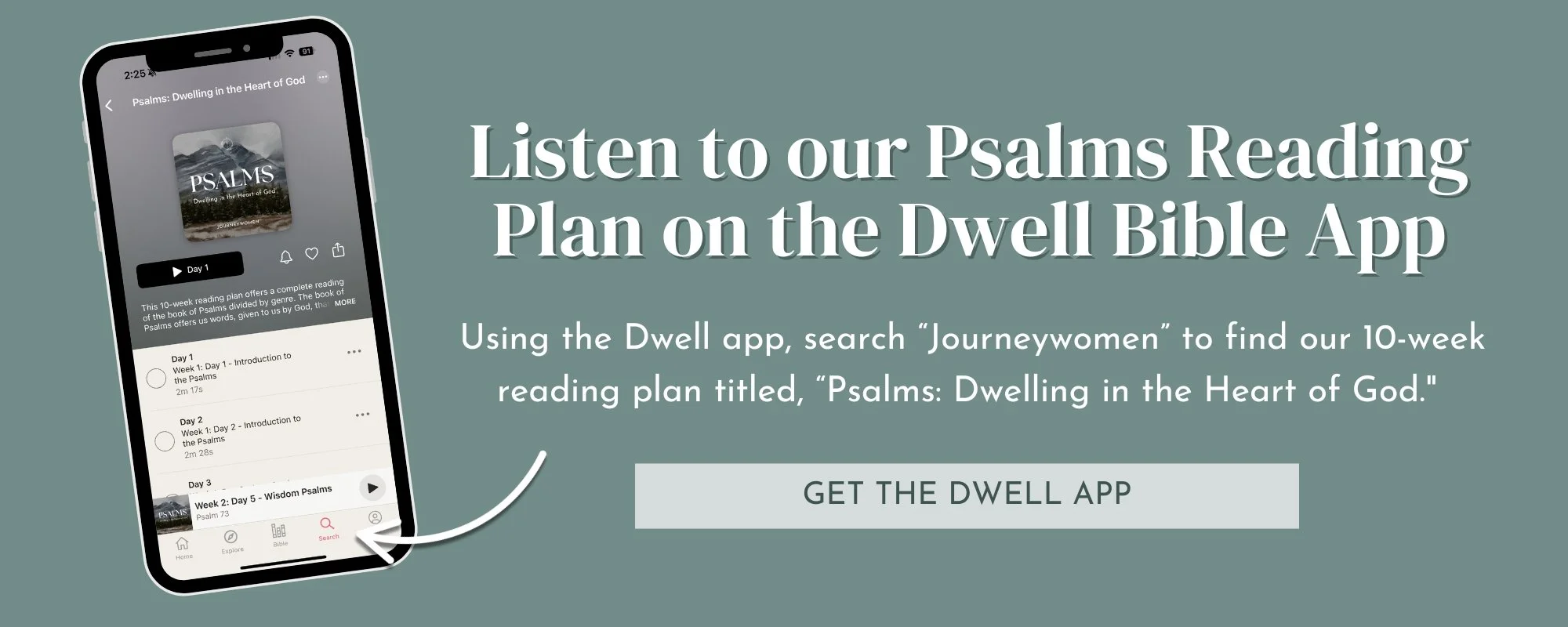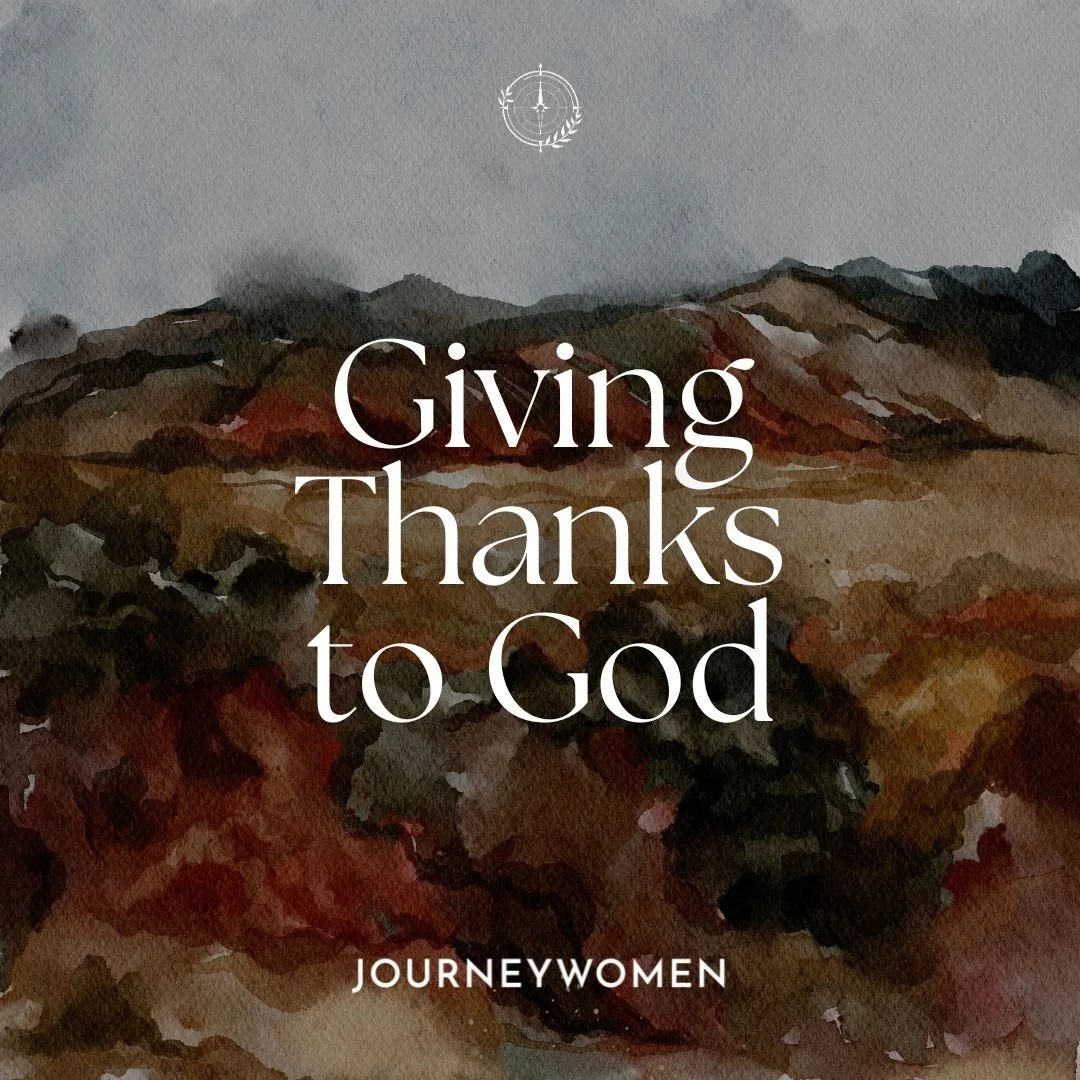Christ in the Psalms
If we only come away from Scripture with more knowledge or some feel-good quotes that we can apply to our lives, we are missing SO MUCH. The Bible is more than just a collection of words. It is a collection of words that tell us about a person—about the Word. The Bible is so precious because it points us to God himself! It teaches us about God’s character, his works, and the salvation that is available through the gospel (the life, death, and resurrection of his Son, Jesus). When we encounter the words on the pages of Scripture, we have the opportunity to encounter God himself. Let’s not miss him.
In this week's episode, we’re looking at messianic psalms, which are those that contain references or prophecies that point to our long-awaited Messiah, Jesus Christ. These psalms shape our understanding of who Jesus is! We pray this episode prompts you to see more of Jesus in Scripture, and that it compels you to trust in the gospel and love Jesus more deeply.
MESSIANIC PSALMS OVERVIEW
Messianic psalms are psalms that contain references or prophecies that point to our long-awaited Messiah, Jesus Christ. They shape our understanding of who Jesus is.
Seeing Christ in the Bible, and especially seeing him in the psalms, brings color to the black-and-white words on the pages of Scripture.
Learning about Christ from other parts of Scripture illuminates the text and presses it more deeply into our hearts as we encounter God in every verse. It reminds us that when we sing along with the psalms of joy, that we can experience true fulness of joy in the person of Christ. It reminds us that when we grieve along with those psalms of lament, that Jesus himself uttered them too, that he experienced the same weight, that he offers hope to us in those dark places.
As we go about our daily lives, as we meditate on a verse while scrubbing dishes or sending emails or walking the dog, we are not simply dwelling on words…we are abiding in the Word, the person of God who is himself our very life.
This Christ, whom we see crying out in pain in Psalm 22, now leads us, restores us, and is with us always in Psalm 23. Because of the bloody and painful death depicted in Psalm 22, we are able to experience the peace and pastures of Psalm 23. He drank the cup dry so that our cups now overflow. We are able to experience intimacy with this Shepherd because on the cross, Jesus functioned as the spotless sacrifice.
Because of Christ’s finished work, death is now described as only a shadow—we only walk through the “valley of the shadow of death,” and even then we can do so without fear. Because of Christ’s affliction, we can now truly not fear in death’s presence. In Christ, death is only a gateway to experience the fullness of Christ in eternity, where truly, as his own children, we will “dwell in the house of the Lord forever” (Psalm 23:6). He leads us in perfect peace, and in following him we will have all that we need—we will have all of him.
If you want to dig deeper into messianic references in Psalms:
In Luke 24, after Jesus was crucified and resurrected (but his disciples hadn’t seen him yet), he was walking with two of them on the road to Emmaus. Blinding them to who he was, he chatted with them about the Messiah and opened their minds to understand the Scriptures, “interpreting for them all the things concerning himself.” Christ opened his disciples' minds to understand the Scriptures and his place in them. What is so amazing about that is that on this side of heaven, we get to do this too! We can discern and dig and study the Scriptures and see Christ’s place in them. We get to see how he is woven into every passage and story and detail and marvel over it all!
Later, after his disciples realized who he was, Jesus said, “These are my words that I spoke to you while I was still with you, that everything written about me in the Law of Moses and the Prophets and the Psalms must be fulfilled” (Luke 24:44). Jesus himself says that the Psalms speak of him. And we see over and over again the New Testament writers harkening back to Psalms (they actually refer to Psalms more than any other Old Testament book!). This tells us
Just a note. These psalms contain clear messianic reflections, but that doesn’t mean that every verse in the psalm is directly applicable to Jesus. Keep that in mind when you’re reading them. Some apply only to the psalmist, but we see the connections as they are fulfilled in Christ’s life and as the New Testament references these psalms:
Psalm 16. Peter in his sermon at Pentecost references this Psalm. He says that David “forsaw and spoke about the resurrection of the Christ, that he was not abandoned to Hades, nor did his flesh see corruption” (Acts 2:31). This is one of the only psalms that specifically mentions Jesus’ resurrection (Psalm 16:8-10). David offers a prediction and prophecy of what is to come in the life of Christ. Peter tells us that David was pointing to Jesus’ resurrection!
Psalm 34:20—“He keeps all his bones; not one of them is broken”—is later fulfilled in John 19:32-33,36.
Psalm 35 talks of a man being “accused by false witnesses” and “Hated without cause”—fulfilled in Mark 14:57 and John 15:25.
Psalm 41:9 we see a man “betrayed by a friend,” a prophecy fulfilled in John 13:18.
Psalm 69:21 writes of the one given “sour wine to drink,” which we see in Matthew 27:34 when Jesus is offered wine mixed with gall.
Psalm 40:7-8 speaks of the one who “delights to do God’s will,” fulfilled in Hebrews 10:7.
Psalm 68:18 talks of the one who “ascended on high”—fulfilled by Jesus in Acts 1:9-11.
Psalm 118:22 points to Jesus’ foreknown rejection, “The stone that the builders rejected has become the cornerstone,” quoted by Jesus himself in Matthew 21:42, Mark 12:10-11, Luke. 20:17, and mentioned in Acts 4:11, Ephesians 2:20, and 1 Peter 2:7.
Psalm 45 was written specifically for the marriage feast of Solomon and Pharaoh’s daughter, but the imagery clearly points forward to the coming Messiah and the future union of Christ in marriage to his bride, to the church, to us. It references the “eternal king” and is quoted by the author of Hebrews (1:8): “But of the Son he says, ‘Your throne, O God, is forever and ever, the scepter of uprightness is the scepter of your kingdom.’” Pointing us to future hope and expectation of our marriage supper with our King.
Psalm 110: Jesus quotes this psalm to the Pharisees in Matthew 22:44 (also recorded in Mark 12;36 and Lk. 20:42-43). This Psalm is written by David, the high king of that day. But Jesus essentially says that this verse could only be talking about him (also mentioned in Acts 2:34-35; 1 Cor. 15:25; Heb. 1:13; 10:12-13). This psalm also refers to the one who is “a priest forever after the order of Melchizedek.” The author of Hebrews loves this passage (Heb. 5:6,10; 6:20; 7:17,21). Melchizedek was a high King in Ethiopia and he was a priest. Some refer to Melchizedek as another ‘type’ or ‘shadow’ of Christ because he points to the one who would be the fully God, fully man, prophet, priest, and king—the one who would come and offer eternal pardon, peace, rule, and life to us—the one, Jesus.
As you spend time in the Scriptures, may you see more and more of Jesus—his power, his humility, his heart, his compassion, his beauty, his redemption. May you clearly see the gospel, and may you trust in it today and every day. May you dwell in God’s Word and may what you learn about Christ there prompt you to love him ever more deeply.
RESOURCES
In the Lord I Take Refuge: 150 Daily Devotions Through the Psalms
DISCUSSION QUESTIONS
How does your thinking about Scripture change when you know it all points to Jesus?
How does seeing Christ in the psalms grow your understanding of who he is? Ask the Lord to give you eyes to see Jesus in his Word and for the Spirit to use this knowledge to grow your love for Christ.
What specific aspects of creation cause you to worship God as Creator? Is it the flowers in your yard, your child’s voice, a magnificent sunset?
How does seeing the humility of Christ in Scripture lead you to worship?
How might you worship God today, right now, in this moment?
How does understanding all that Christ bore on the cross prompt you to worship him?
How does thinking about Jesus’ death on the cross affect you as you walk through the valley of the shadow of death? How does it change your view of your Good Shepherd?
RECENT ARTICLES
IMPORTANT NOTE
Journeywomen interviews are intended to serve as a springboard for continued study in the context of your local church. While we carefully select guests each week, interviews do not imply Journeywomen's endorsement of all writings and positions of the interviewee or any other resources mentioned.
Affiliate links used are used where appropriate. Thank you for supporting the products that support Journeywomen!
FOR MORE OF JOURNEYWOMEN
Subscribe: Apple Podcasts | Spotify
Follow Us: Instagram | Facebook
Support the podcast by writing a review



















